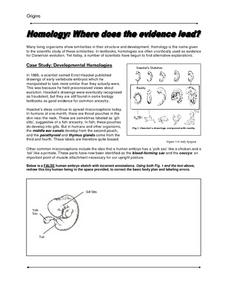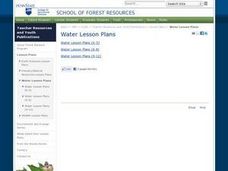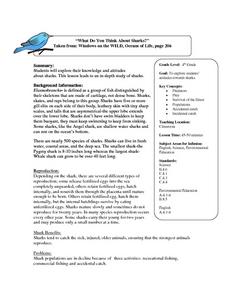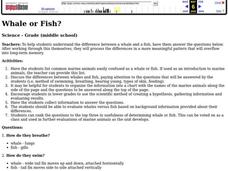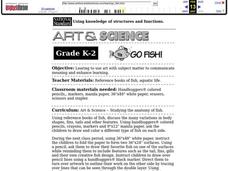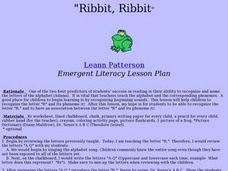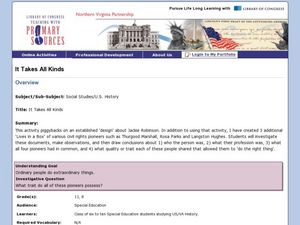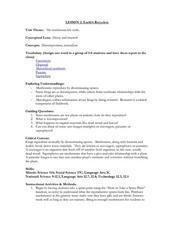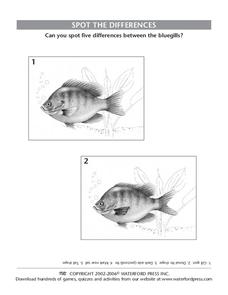Curated OER
CSI Clamshell Investigation
Students explore predator/prey relationships. They research information on moon snails and claims. Students draw conclusions from the data collected. They use math and graphing to determine if there is a relationship to the clam's size...
Curated OER
Homology: Where Does The Evidence Lead
Students are introduced to the topic of homology. In groups, they read a case study and compare different drawings of early vertebrate emryos. They work together to answer discussion questions and label the various parts of each embryo.
Curated OER
Name That Shark!
In this online quiz learning exercise, students answer a set of multiple choice trivia questions about names of sharks. Page has a link to answers.
Curated OER
"Pennsylvania Watersheds, Many Ways to the Sea"
Students trace a molecule of water through the water cycle including each of its three loops. They describe why evapotranspiration demands the largest portion of total precipitation falling on a forested watershed.
Curated OER
Fish Workings
Students observe, hypothesize, and draw conclusions regarding fish. They examine their anatomy, and how they function in their environment.
Curated OER
What Do You Think About Sharks?
Fourth graders explore sharks. They read a story about sharks and act out using Reader's Theater. They discuss fact and attitude statements about sharks and complete a Shark Survey. They create a shark promotion brochure informing...
Curated OER
Whale or Fish?
Learners explain the difference between a whale and a fish. After working through this themselves, they process the differences in a more meaningful pattern that overflows into long-term memory.
Curated OER
Go Fish
Students use art with subject matter to communicate meaning and enhance learning.
Curated OER
Potato Fish Adaptations
Students examine fish adaptations. They identify types of adaptations, and create a 3-D model of an imaginary fish that demonstrates various adaptations using a potato and craft materials.
Curated OER
Ribbit! Ribbit!
Students research a frog's life cycle and habitat using books, the Internet and lecture. Students make origami frogs, write letters to Toad from Arnold Lobel's "Frog and Toad" and participate in a simulated camouflage activity.
Curated OER
It Takes All Kinds!
Pupils view video clips and observe similarities and differences between animals. They sort animals into groups for a zoo. They make a graph of their observations and review scientific classifications.
Curated OER
My Favorite Meal
Students investigate ecological systems and the multiple uses of the environment by studying the osprey population.
Curated OER
Earth's Recyclers
Students work together in groups to report on different topics related to decomposition. They answer questions and share their answers with the class. They discuss any topic that is unclear.
Curated OER
When Fish Die
Young scholars discuss what to do with a very sick fish and help it to die without much pain. As a class, they answer questions about the fish and if they believe it is suffering or not. Using their own experiences, they share how they...
Curated OER
Dissolved Oxygen
Students discuss the relationships between dissolved oxygen in a stream, stream temperature, organic waste loads, and stream conditions by studying and using a model of dissolved oxygen in the stream.
Curated OER
Internet Gastropod Research
Use the Internet to research gastropods. Using their textbook, students identify questions by topic they are interested in finding more in depth information. They answer each question and cite at least two internet URLs for each. They...
Curated OER
Dissolved Oxygen Lesson
Students investigate what dissolved oxygen is and why it is important to aquatic life and what factors influence levels of dissolved oxygen in a lake. They study how to use MS Excel to make charts to show trends and correlations.
Curated OER
Water Quality Monitoring
Pupils comprehend the four parameters of water quality. They perform tests for salinity, dissolved oxygen, pH and clarity or turbidity. Students comprehend why scientists and environmental managers monitor water uality and aquatic...
Curated OER
Spot the Differences
In this science and visual discrimination worksheet, students examine 2 nearly identical pictures of a bluegill fish. Students tell or write the five differences between them.
Curated OER
Frog Life Cycle Crossword
In this crossword worksheet, students complete a 9 word crossword puzzle about the life cycle of the frog, accompanied by pictures.
Curated OER
Observing and Drawing Structures of Guppies and Goldfish
Students observe fish and focus on their structures. In this life science lesson, students work in a group and observe guppies and gold fish.
Curated OER
Something's Fishy
Fourth graders identify parts of a fish. In this fish anatomy lesson, 4th graders identify parts of fish in a group setting and then complete a worksheet about the parts of a fish.
Curated OER
Animals
Students research and study animals. In this animals lesson, students draw pictures of animal movements and create animals books. This activity is meant to be a culminating activity for a unit on animals.
Curated OER
Microorganism Multiplication
Seventh graders complete two experiments to learn about harmful and helpful microorganisms. In this microorganisms lesson, 7th graders read background information about fungi, yeast, and club fungi. Students then complete two experiments...
Other popular searches
- Lungs vs. Gills
- Fish Gills
- Lungs Gills
- Sharks Gills
- Fish and Gills
- Gills Oxygen
- Lungs vs Gills
- Gills and Lungs
- Gills Free
- Gills Free Worksheet
- Gills or Lungs



